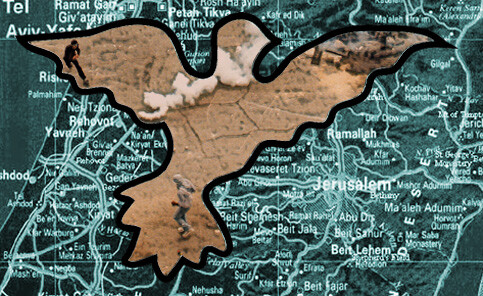The Chicago Tribune 28 July 2003

(Graphic by Nigel Parry)
The road map for Palestinian-Israeli peace is in trouble. With the Palestinian and Israeli leaders visiting Washington in quick succession, the Bush administration has a chance to stop it from running into a ditch.
For the peace process to succeed, ordinary Israelis and Palestinians both need to see that they stand to gain from it. So far the results are lopsided.
Palestinians have made significant progress toward fulfilling their commitments. Prime Minister Mahmoud Abbas, despite deep skepticism among the Palestinian public, managed to negotiate a unilateral Palestinian cease-fire by all key factions. The result has been a virtual cessation in the violence faced both by innocent Israeli civilians and Israel’s occupation army. This is something Israel was never able to achieve through years of assassinations, home demolitions, curfews and collective punishments. Polls show that most Israelis support the peace process and want it to succeed.
Yet Israeli Prime Minister Ariel Sharon shows little sign of reciprocating. He has dragged his feet on the release of thousands of Palestinian prisoners, and has done little to ease the conditions under which Palestinians live.
The respected Association of Civil Rights in Israel has just issued its annual report condemning the army for abuses of Palestinians. “Most of the abuses,” the report states, “occur not as a result of operational necessity on the part of the army, but from vindictiveness on the part of soldiers, who receive implicit approval to denigrate the dignity, life and liberty of innocent Palestinians.”
This kind of humiliation touches every aspect of Palestinian daily life. As Chicagoans escape the summer heat by heading for the lakefront, here is one example that might resonate. Dozens of Palestinian children in Gaza held a peaceful demonstration in the searing July sun to demand that the Israeli army allow them to play on the beach that is a few hundred yards from their refugee camp. Yet the beach remains reserved for the exclusive use of a handful of the 5,000 Israeli settlers who continue to occupy more than a fifth of Gaza’s land.
It is hard to imagine the frustration that such unfairness causes to the more than 1 million Palestinians crammed into the rest of the territory, who have no respite from poverty, rampant unemployment and the sheer boredom of life under occupation.
The reason that the earlier Oslo accords failed to bring peace, as former U.S. Special Middle East coordinator Dennis Ross has acknowledged, was the wide gap between the rhetoric of peace, and the harsh reality for Palestinians on the ground. The single biggest reason is the settlements, which interfere with every aspect of daily life.
In its first phase, the road map says that Israel “immediately dismantles settlement outposts erected since March 2001,” and “freezes all settlement activity [including natural growth of settlements].”
But Sharon told the Israeli Knesset last week : “The future of Jewish settlement in Judea and Samaria [the West Bank] and the Gaza Strip will be debated only when we get to final status negotiations.” Sharon added, “We have no intention of doing it now. It is not in Israel’s interest to do it now.”
When Sharon met President Bush and Abbas in Aqaba, Jordan, in June, Sharon pledged to begin removing “unauthorized” settlement outposts immediately. But the Israeli group Peace Now, which monitors settlement activity in the occupied territories, found that the number of outposts has actually increased by at least two since Bush praised Sharon for making that promise. And shortly after the summit, Sharon told the Israeli Cabinet that settlers could continue to build on Palestinian land but should do so “quietly” so as not to arouse international ire. Israel has also continued to build a 12-foot high concrete wall in the West Bank, which effectively annexes vast tracts of Palestinian land to Israel.
In its April 2001 report, an international team headed by former U.S. senator and Northern Ireland peacemaker George Mitchell stated that, “a cessation of Palestinian-Israeli violence will be particularly hard to sustain unless the government of Israel freezes all settlement construction activity.” This report is one of the foundations of President Bush’s road map, and he should heed its advice.
If we are avoid a slide back into the deadly cycle of violence, Bush needs to make Sharon understand that it is no good saying one thing to the world in English and another back home in Hebrew. At the Aqaba summit, Bush promised he would “ride herd” to keep the peace process on course. This is the time to show that wasn’t just Texas tough talk, and ensure that this rare opening is not lost.
This article was first published in The Chicago Tribune on 28 July 2003.





